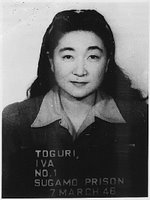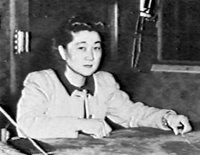 women broadcast Japanese propaganda to Allied troops. She was never referred to as Rose or Tokyo Rose. On air she used the name Orphan Ann, an takoff of the American character Orphan Annie. Tokyo Rose was a name given by the Allies to the various female Japanese broadcasters on NHK. Since WWII it has been used almost exclusively in reference to Ms. D'Aquino.
women broadcast Japanese propaganda to Allied troops. She was never referred to as Rose or Tokyo Rose. On air she used the name Orphan Ann, an takoff of the American character Orphan Annie. Tokyo Rose was a name given by the Allies to the various female Japanese broadcasters on NHK. Since WWII it has been used almost exclusively in reference to Ms. D'Aquino.NHK had been created in 1926 and was modeled after the BBC. Before WWII it was a perfectly mudane news radio service. In November 1941, the Japanese Army nationalized it. The newly born propaganda machine was was shut down 4 yeras later immediately following the Emperor's concession speech in 1945.
The Japanese Imperial Army's 8th Section G-2 Psychological Warfare coordinated the national
 news agencies. (print and radio) Underneath that rather bureaucratic name, they were also Japan's primary generator of millitary propaganda. In early 1943, the Japanese Army developed facilities to monitor short-wave US radio broadcasts. They cherry picked this to assemble a program made primarly of bad news to run on Radio Tokyo NHK.
news agencies. (print and radio) Underneath that rather bureaucratic name, they were also Japan's primary generator of millitary propaganda. In early 1943, the Japanese Army developed facilities to monitor short-wave US radio broadcasts. They cherry picked this to assemble a program made primarly of bad news to run on Radio Tokyo NHK.Iva was one of these DJs. The head of G-2, Major Tsuneishi decided to have his POWs broadcast a news program of such items to demoralize front-line U.S. troops. The show would be called the Zero Hour. The shows following came from the fact that it contained both popular jazz and content that had been censored from Allied news broadcasts. By November of that year they also added female announcers to further entire allied listening. You can hear recordings of her here: http://www.earthstation1.com/Tokyo_Rose.html
After the war, she was convicted of treason and imprisoned, released early for good behavior. She maintained her innocence, asserting that she had not said the words used to convict her, and that she had remained a loyal American. Though forced to broadcast to the troops, she claimed that she, with the help of American POWs assigned to the radio broadcasts, made herself and her words purposefully ridiculous. She had refused to give up her American citizenship, despite pressure and even punishment from the Japanese who forced her into the broadcasting role.
 In the 1970s a public campaign brought to light the testimony of the POWs who worked with her and supported her story. The testimony of the witnesses against her was questioned. Eventually she was pardoned by President Gerald Ford.
In the 1970s a public campaign brought to light the testimony of the POWs who worked with her and supported her story. The testimony of the witnesses against her was questioned. Eventually she was pardoned by President Gerald Ford.*In a related but truly weird note, according to documents found in a 1974 Freedom of Information Act request the US Army Intelligence’s beleived (at least in 1944) that Amelia Earhart was Tokyo Rose.




No comments:
Post a Comment